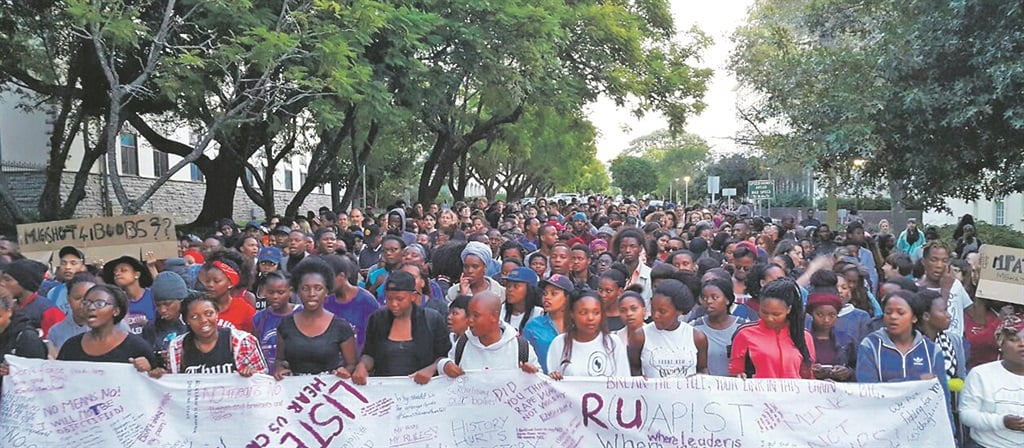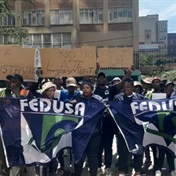
The national rape outcry reached a fever pitch at Rhodes University this week, with the campus shutting down after a list named and shamed men accused of sexual assault. S’thembile Cele and Ndileka Lujabe speak to an accuser and an accused, and consider this new chapter in SA’s gender wars
A woman who had accused one of the men who appears on a list of alleged rapists at Rhodes University says seeing his name there gives her the affirmation she has craved since she was violated.
“He was someone I had to see on campus almost every day,” she told City Press in an exclusive interview this week.
“I would see him and remember his hands around my throat, the bruises left on my shoulders, and the tears in the shower afterwards when I couldn’t scrub away my feelings of defilement. I had to see him interact, date and hook up with other women. I tried to warn them, but with no university backing, how could my words have any weight?”
When she tried to report what had happened to her, she was advised to drop it.
“I tried to bring a case to the university, but with no physical evidence, I was advised by the harassment officer that it would be a ‘he said, she said’ battle and that I’d lose.”
The young woman did not lay a charge of rape with the police, believing she would not win.
“I was left emotionally and physically shattered. I developed severe post-traumatic stress disorder and depression, and my anxiety disorder spiralled out of control, to the point where I was having panic attacks if he walked into the bar when I was out with friends, or if I had to pass him on campus.
“The administration failed to support me, and the counselling centre sent me away, telling me that because I still attended my lectures, I was obviously fine.”
The young woman is not the only person who has accused the same man of rape. Three other female students who cannot be named made the same accusations to City Press this week.
The list was anonymously posted on a Facebook page called RU Queer Confessions, Questions and Crushes on Sunday evening. The topic trended on Twitter under the hashtag #RUReferenceList.
The Facebook page has since been deleted, but not before more names were added, some via Twitter, bringing to 15 the number of men accused of rape or sexual assault by women at the university in Grahamstown in the Eastern Cape.
The list was also shared on the university’s Students’ Representative Council (SRC) page. In a precursor to this week’s protests, on April 11, the SRC members posted a photo of themselves in a tweet to generate awareness of campus rape culture.
Soon after, a female student tweeted that one of the men in the photo had raped her friend. The SRC responded with urgency, later establishing a campaign called Chapter 2.12 (referring to the Constitution) to fight sexual abuse on campus.
After Sunday’s release of the list, students at Rhodes began to protest, some going as far as knocking on the doors of the residences where the accused men stay, calling on them to come out and face their accusers.
It led to a university shutdown and a bare-breasted protest, a violent police response and a showdown with university management.
One of the men on the list released a statement on Wednesday afternoon denying the claims against him and expressed solidarity with the cause of the Rhodes anti-rape activists.
Another man accused of rape by a Twitter user told City Press he was considering legal action.
The man, who works at the university, said he intended to sue the woman who tweeted that his name should have been on the list. Also in his sights was another Twitter user who commented on the initial tweet.
“I sent [them] a message to tell them that they’d better have proof. I can confirm, 1 million percent confirm, that I have never committed a sexual offence,” he said.
“Although some of the people [may be] legit rapists, I do think that other people are being added [to the list] unfairly, and some of the allegations don’t have any backing.”
He believes his accuser is being vindictive, and put his name on Twitter in the hopes that a victim would come out and say something.
Nobody has claimed responsibility for the list.
Grahamstown police spokesperson Mali Govender said: “It’s a very serious matter that’s turned into a civil matter. Naming people without solid proof, especially in cases of sexual assault, is very serious.
“We try to protect the victim as far as possible. As far as offenders are concerned … only after they plead in court do we actually name them.”
Govender said she had no knowledge of where the list originated, or of the alleged perpetrators, and said the university had not approached the police to ask them to investigate it.
She said police were monitoring the situation and invited victims to open cases. Cases are now being reported, but no statistics will be released.
University vice-chancellor Sizwe Mabizela – who is being accused by students of manhandling a female protester this week – has urged students and staff to report rape and sexual harassment.
He said this week that the concerns surrounding sexual violence and rape culture were valid, and that the university was committed to raising awareness about gender-based violence and sexual assault.
He also said several task teams had been established to improve support structures available to rape survivors, in addition to the review of existing policy and protocols for charging offenders.
The public naming and shaming of alleged campus sex offenders began last year when the #RhodesMustFall and #FeesMustFall movements began.
Dr Kelley Moult of the Gender, Health and Justice Research Unit the University of Cape Town (UCT) says protests at Rhodes are a result of a sense of disempowerment caused by the silence of institutions about sexual violence on campuses.
“A recent review of the Discrimination and Harassment Office (Discho) at UCT, which deals with sexual violence on campus, points to many systemic failures, including the very small number of Discho officers and wellness centre counsellors available to assist survivors of sexual violence.
“The review also heard testimonies about survivors who have dropped out of university because their rapists have been allowed to get off scot-free, and have therefore been allowed to continue taking classes alongside the women they rape.”
Last year, #RapeAtAzania trended on Twitter when a female student at UCT said she was penetrated in her sleep while occupying the Bremner administration building – renamed Azania House by protesting students – by a fellow student.
City Press also reported on a group of female students at Michaelis, UCT’s prestigious art school, who protested against sexual harassment by male students, naming one of the accused, a star student.
Charges were laid against him and he was expelled following an internal process. His expulsion was then suspended on condition that he complete 65 hours of community service and not commit further offences while studying at UCT.
Rhodes University is set to reopen tomorrow.
Where does the law stand on publicly naming alleged rapists and sexual abusers?
“This act is unlawful and would constitute criminal defamation,” says Ulrich Roux, a director at BDK Attorneys.
“The definition of criminal defamation is the unlawful and intentional publication of a matter concerning another which tends to injure his or her reputation.”
Citing the case of S v Motsepe 2015, Roux says that “the court held that freedom of expression does not have superior status to the other rights under the Constitution, such as the right to dignity and the right to privacy ... In my opinion, it would therefore be illegal to publish this document.”
The men on the Rhodes University list could, says Roux, take criminal action in the form of charges of intimidation “against the members of the public who are calling them to step out of their homes and step down from their positions”.
They could also pursue civil action in the form of an urgent interdict or a damages claim based on defamation.
And when it comes to the social-media platforms used to publish a list like this?
“They could bring an application against the social-media platform ... in an attempt to compel them to release the information about the group who posted the list or the person who posted the list,” says Roux. – S’thembile Cele




 Publications
Publications
 Partners
Partners








